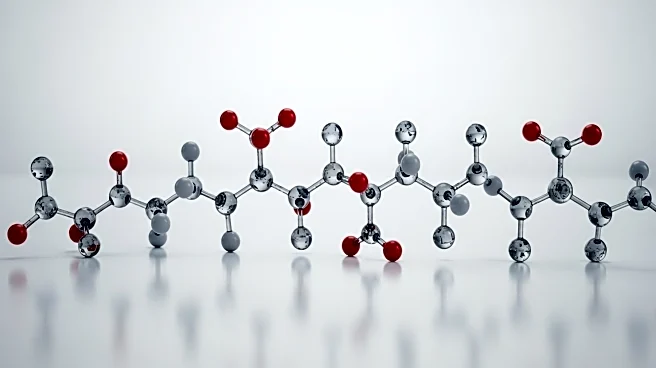What's Happening?
Recent research has focused on improving the degradability of poly(lactic acid) (PLA) by introducing thionoester linkages through ring-opening copolymerization. The study synthesized thiocarbonyl L-lactide
(SLA) and explored its copolymerization with lactide (LA) using tin(II) 2-ethylhexanoate as a catalyst. This process resulted in copolymers with thionoester functionalities, which demonstrated distinct degradability under specific chemical stimuli. The copolymers maintained comparable thermal properties to PLA, with a glass transition temperature of 54°C and a melting temperature of 164°C. The research indicates that even minor incorporation of thionoester bonds can lead to effective molecular weight reduction upon treatment with amines, suggesting potential for enhanced biodegradability.
Why It's Important?
The introduction of thionoester linkages into PLA represents a significant advancement in biodegradable plastics. PLA is widely used in various industries due to its renewable nature, but its slow degradation rate poses environmental challenges. Enhancing its degradability could lead to more sustainable plastic solutions, reducing plastic waste and its impact on ecosystems. Industries that rely on PLA, such as packaging and textiles, could benefit from this innovation by offering products that align with increasing consumer demand for environmentally friendly materials. This research could also influence public policy and regulatory standards regarding biodegradable plastics.
What's Next?
Further research and development are likely to focus on optimizing the copolymerization process to control the extent of thionoester incorporation and molecular weight reduction. This could involve exploring different catalysts and feed ratios to enhance the efficiency and scalability of the process. Additionally, testing the copolymers in various environmental conditions will be crucial to assess their real-world biodegradability. Stakeholders, including manufacturers and environmental groups, may advocate for the adoption of these materials, potentially influencing market trends and regulatory frameworks.
Beyond the Headlines
The introduction of thionoester linkages in PLA could have broader implications for the development of smart materials that respond to specific stimuli. This could lead to innovations in fields such as medical devices, where controlled degradation is crucial. Ethical considerations regarding the environmental impact of plastics and the responsibility of industries to adopt sustainable practices may also gain prominence, influencing consumer behavior and corporate strategies.











